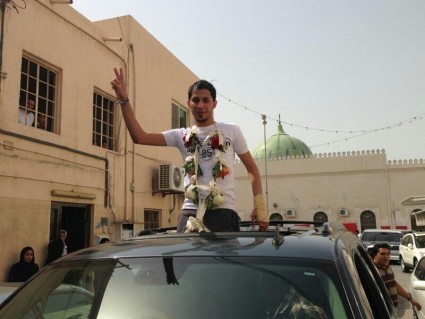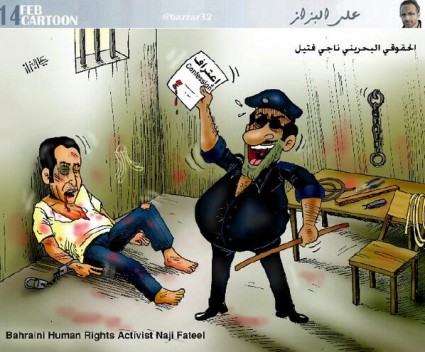Yousif Al-Qassab, Freed
May 10, 2013 No Comments
President Obama, Immoral, Illegal, Political Detentions are Wrong in Bahrain and Wrong in the US
May 10, 2013 No Comments
Bahrain’s King Hamad, high on powerful narcotic says, “We don’t have aristocracy in Bahrain; we are all commoners.”
“We don’t have aristocracy in Bahrain; we are all commoners.”: In an interview with Souad Mekhennet, a 2013 Harvard Nieman fellow, Bahrain’s King Hamad bin Isa al-Khalifa reaffirmed his commitment to reform, stating, “I myself want change, maybe more than anyone.” He acknowledged that “it is fine to disagree with the government,” but the only way to do so is through “dialogue.” When asked if the protests throughout the country were terrorist acts, however, he stated “Yes, of course.” King Hamad later professed his desire for “a free and ethical media,” and announced that Bahrain is “going to establish a council… with members from all stakeholders of society,” and that “this council will set the policy for the media.” Mekhennet then brought up allegations of journalists being denied visas, which the King denied. Throughout the interview, King Hamad reassured Mekhennet that Bahrain was on the path to reform: “no one in Bahrain is prosecuted for their opinions,” he said, and stated “Bahrain is a constitutional monarchy… Democratic constitutional institutions are already in practice.” He pointed out, “This is not an absolute monarchy here like in some ancient times in France or Britain,” and in response to whether the royal family dominates key government positions, the King claimed, “We don’t have aristocracy in Bahrain; we are all commoners.” He later compared the parliamentary system in Bahrain to the legislative branch in the U.S. and concluded the interview by pointing out that the U.S. has human rights problems too, and so, “Bahrain is like the U.S. and other countries; this is in an ongoing process.” …more
May 10, 2013 No Comments
Free Naji Fateel!!
May 10, 2013 No Comments
Escape From Bahrain: Ali Abdulemam Is Free
Escape From Bahrain: Ali Abdulemam Is Free
Thor Halvorssen – 10 May, 2013 – The Atlantic
After more than two years in hiding, Ali Abdulemam, the globally renowned blogger and free-speech advocate, has been freed from the Kingdom of Bahrain. Abdulemam is now safely in Europe, after a dramatic escape in a secret compartment of a car, and will make his first public appearance in more than two years on Wednesday at the Oslo Freedom Forum (OFF).
In 1999, Abdulemam created the pro-democracy news website Bahrain Online, the island’s first free Internet forum for political and social debate, becoming a pivotal architect of his country’s political blogosphere. Because of this, and his related efforts to promote human rights in his country, Abdulemam was detained numerous times by the Bahraini authorities — eventually imprisoned in September 2010 along with 25 other human-rights activists for “spreading false information” and defaming the king — and subjected to interrogation, beatings, and torture. Despite being blocked by regime censors, Bahrain Online still regularly gets more than 100,000 hits a day.
In February of 2011 Abdulemam accepted an invitation from the Human Rights Foundation (HRF, OFF’s parent organization) to give a talk on dissent in Bahrain. Two weeks later, amid massive anti-government protests, he sent a cryptic tweet and abruptly disappeared. Three days after that, police ransacked his house. In June of 2011, Abdulemam was tried in absentia by a military court and sentenced to 15 years in prison for “plotting” an anti-government “coup.”
In 2012, with Abdulemam’s whereabouts still unknown, his wife was invited to the Oslo Freedom Forum but was unable to attend because of family commitments. This year, in close cooperation with another organization, HRF took a much more aggressive approach: planning Abdulemam’s escape from Bahrain.
The Democracy Report
On a number of previous occasions, Human Rights Foundation personnel had gone to extensive lengths to obtain testimony for OFF from people who try to challenge arbitrary power and dictatorship through non-violence advocacy and empirical data. In 2010, HRF representatives traveled to Cuba with hidden camera equipment and were able to obtain the testimony of celebrated blogger Yoani Sanchez and the Ladies in White dissident movement. OFF personnel also traveled to Vietnam to visit persecuted Buddhist monk Thich Quang Do. They snuck into the Saigon monastery where he remains under house arrest and captured Thich’s thoughts on democracy, human rights, and the intolerance of the Vietnamese regime. The Vietnamese authorities intercepted one HRF staff member, who was arrested and severely beaten by their intelligence police, but the digital recording of the monk’s testimony made it safely to Oslo. Why not now help Abdulemam escape Bahrain, where the authorities had instituted a permanent manhunt for him?
Here’s how we hatched a scheme to get Ali Abdulemam out of Bahrain — and learned again how even the best laid-plans can be overtaken by random luck:
We consulted with Nasser Wedaddy, a Muslim human-rights advocate working at the Boston-based American Islamic Congress (AIC). Wedaddy was the man who had first alerted Abdulemam when the crackdown started in Bahrain, literally waking Abdulemam up in the middle of the night and asking him to go into hiding immediately. Abdulemam knew to pay attention because Wedaddy had led the noisiest campaign of pre-Arab Spring uprisings to pressure for Abdulemam’s release after his previous arrest in September 2010.
My next call was to John Peder Egeneas, Secretary General of Amnesty International in Norway. Egeneas was categorical: After Chen Guancheng’s escape from house arrest in China, it’s the duty of human rights advocates to assist and participate in action like this. If it worked in China, why not in Bahrain?
Together with other human rights groups, we determined that the escape would have to rely on non-violence and could only be accomplished with the tools of public exposure and creativity. We immediately agreed that all communications and calls between us would have to be encrypted, and that we would have to create aliases for everything. Ali became “Bjørn” and Bahrain became “Fiji.” …more
May 10, 2013 No Comments































